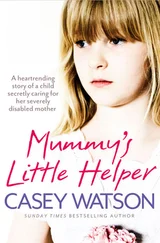Nice one, Shona! I thought, as the children began to settle to their planning. What a clever, intuitive, emotionally intelligent girl she was. She would be okay, would Shona, I decided. Her late parents would have been so proud of her.
Which got me to thinking – what was the situation with Imogen’s exactly? With the dad? The second wife? And where exactly was her mum? What precisely was the root of her current troubling situation? I would find out more about the family at some point, I imagined. But in the meantime, as of today, I was on a mission.
If there was no physical reason for Imogen’s silence – and it seemed there wasn’t – then my own mission, I decided, as the children set about their engineering one, was to find a way to get her to speak. To me.
Leaving the children occupied with their exciting engineering activity left me freed up to do a little more research. I’d already looked up the basics of selective mutism on the internet, and everything I’d discovered so far had told me pretty much the same thing: that children with the condition ‘opted out’ of speaking in social situations – of which school was an obvious example. Most of the time, however, they spoke completely normally in close family environments, when no one else was listening – as in at home.
I wasn’t sure about that key phrase ‘opt out’, though. It seemed to me – again, reading the research I had come across – that it wasn’t a case of a child ‘opting’ not to speak, but rather of them literally being unable to do so. In fact, another thing I learned was that children found it so distressing that they would actively avoid situations which would bring on their mutism. And, unfortunately, you couldn’t avoid school.
But where had it come from? In Imogen’s case, what had been the trigger? That there had been one didn’t seem to be in doubt. So it was a case of going back, then – back in time to look at the history. Because if I could tease out what had caused it, I had the best tool to help her. Without knowing it, we wouldn’t be addressing the problem – only the symptoms. Simple logic, but it seemed the best place to start.
My session on the computer done, I sat at my desk and watched Imogen intently. Shona, ever the mother hen, bless her, was doing her best to take charge of their little group. And, taking her lead, Molly seemed to be adapting to their unusual situation, understanding the need to provide a commentary, to compensate for the lack of reciprocation when either of them spoke to our newest Unit ‘recruit’. ‘That’s right, Imogen,’ she was saying, ‘Shona meant to criss-cross the straws there, just like you’ve drawn them. Well done.’
I had to smile. If you’d witnessed it cold you’d imagine they were speaking to a much younger child. But Imogen didn’t seem to mind. In fact, her expression, usually so deadpan, seemed to soften now the girls were clucking and fussing so much around her. Was that it? Did she lack attention? Feel excruciatingly self-conscious? It was so hard to fathom someone who didn’t speak. All those little clues. It wasn’t just what children had to say to you that mattered – you learned so much just from the way they spoke, too.
I was just pondering our little enigma when Kelly breezed in, beaming smiles for all, as per usual. Imogen glanced up, but I noticed she took very little interest. Not anxious, not nervous, not stressed by a new person. Perhaps shyness wasn’t a factor here at all.
‘You must have read my mind,’ I told Kelly, standing up to pop the kettle on for coffee. ‘I could actually do with nipping to the staffroom – got to make a phone call. If you’re free to hang around for a bit, that is.’
Kelly nodded. ‘If you’ll throw a chocolate digestive into the deal, I’ll happily stay,’ she said. ‘I’m free till lunchtime as it happens. All yours.’
I gave Kelly a quick update on what the children were up to and, before I left, sensing that I ought to let Imogen know what I was doing, went across to the girls’ table to let her know.
‘This is looking good,’ I told them all, looking at the planning notes they’d made already, then, lowering my voice, said, ‘You know, you might have a good chance of winning, girls. And, Imogen, your handwriting’s really neat.’
There was no reply from her, obviously, but I saw that same flutter of recognition that she’d understood and was pleased with what I’d said. What could it be like, I wondered, to have that barrier between yourself and the world? Did she want to respond, formulate an answer, yet be physically unable to deliver it, or was it a more conscious thing? What a curious thing it was. Particularly since she spoke normally at home.
Mrs Hinchcliffe didn’t seem particularly pleased to hear from me. In fact I got the impression as soon as she answered the phone that despite my having already mentioned that I’d like to, she felt my calling her was somehow irregular. I assured her that wasn’t the case; that, where practical, it was an important part of my role to try and work in co-operation with a child’s parents or guardians, to give them the best chance to deal with whatever their particular problems were and help ease them back into mainstream life in school.
‘Well, I don’t know that there’s much I can tell you,’ she said. ‘She was living with her dad before, as you know, and having lots of problems at her old school. Bullying, teasing, that sort of thing.’
‘Just her and Dad, then?’ I asked. ‘What about Mum?’
I heard her sigh. ‘No, no,’ she said. ‘I told you, Imogen lived with my son. It had just been the two of them since her mother walked out on the pair of them …’
‘Oh, dear. I’m sorry to hear that.’
‘Yes, well …’ said Mrs Hinchcliffe. ‘Believe me, you don’t know the …’ And then she checked herself. She was clearly anxious not to be indiscreet. ‘And they were fine …’
‘So does Imogen see her mum at all?’
‘No, she doesn’t. Not at the moment.’ I could hear the edge in Mrs Hinchcliffe’s voice still. ‘She’s been getting settled into her new life, and – well – it’s not really for me to say, Mrs Watson. It’s none of my business, is it?’
The implication being that it was none of mine either. But yes, it was her business. It was certainly her business. She was the one holding the flipping baby, wasn’t she?
‘I suppose not,’ I said anyway, because I didn’t want to antagonise her. What I really wanted to ask next was why he wasn’t bringing up his daughter. There must have been a reason, after all. But that would only antagonise Mrs Hinchcliffe further, I didn’t doubt, especially as I was fast getting the impression that my line of enquiry was one that wasn’t really considered relevant. I was being fed the line that it was bullying at school that had prompted Imogen’s selective mutism – but what about her mum? Might her absence from Imogen’s life have some bearing? I tried to imagine how Kieron or Riley might have coped if I’d disappeared suddenly from their lives – and I couldn’t. Losing a mother was a huge thing. Surely it must have contributed?
I took another tack. ‘So, Dad – your son – he’s on his own now, then, is he?’
‘No, not at all,’ said Mrs Hinchcliffe. ‘Graham has a new partner. Lovely girl, she is. That poor woman,’ she said with sudden animation. ‘It’s a lot to take on for anyone, isn’t it? Someone else’s child. And what with Graham working away …’
‘Oh,’ I said. ‘He works away, does he?’
‘He’s a coach driver, dear,’ she said. ‘European tours. Luxury ones …’ And with the emphasis on the ‘luxury’ bit. I could hear the pride in her voice.
Читать дальше












